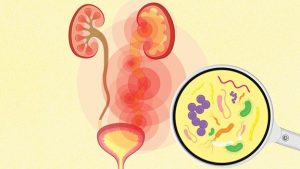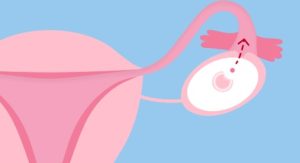Have you ever looked in the mirror and noticed an unwelcome new zit right around that time of the month?
You’re not alone. For many women, hormonal changes around menstruation can trigger breakouts. If you struggle with PMS-related acne, understanding what’s happening in your body can help you cope with those periodic pimples.
Get yourself a cup of tea and let’s delve into this informative post!

The Hormonal Link: How Estrogen and Progesterone Affect Acne
The hormones estrogen and progesterone are major players in the acne flare-ups many experience before their period. When estrogen levels drop during the luteal phase of your cycle, right before menstruation, it stimulates your oil glands to produce excess oil. This oil, combined with dead skin cells, clogs up hair follicles and pores, allowing bacteria to build up and cause angry red pimples.
Progesterone, which also rises during this phase, can make your skin more sensitive to the effects of estrogen and androgens like testosterone. It may make you more prone to breakouts by slowing cell turnover in the follicles. The result is oil, dead cells, and bacteria trapped below the surface – a perfect storm for zits.
Treating Hormonal Acne
To tackle period pimples at the source, you’ll need to rebalance your hormones and support your body’s detoxification pathways. Drink plenty of water to flush out toxins, cut back on sugar and refined carbs, get enough sleep, and exercise regularly. Managing stress is also key, as cortisol spikes can worsen hormonal acne. Consider natural remedies like evening primrose oil, zinc, and vitamin B6 as well.
For women with severe cystic acne, hormonal birth control pills or anti-androgen medications may help override the hormonal triggers. Topical retinoids, benzoyl peroxide, and salicylic acid remain effective for clearing up existing blemishes and preventing new ones from forming.
With the right combination of lifestyle changes and medical interventions suited to your unique needs, you can minimize and even prevent PMS-related acne breakouts. Clear skin can be yours all month long.
Managing Monthly Breakouts: Lifestyle Tips and Treatment Options
It’s that time of the month again, and you’ve noticed angry red pimples popping up on your face like clockwork. Don’t worry, you’re not alone. Many women experience premenstrual acne flare-ups due to hormonal changes in the body.
Managing Monthly Breakouts: Lifestyle Tips and Treatment Options
To help prevent pimples before your period, start by reducing stress levels. Try yoga, meditation, or deep breathing – keeping cortisol levels in check will benefit your skin. You should also avoid excess sugar and refined carbs which can spike insulin and promote breakouts.
Stick to a consistent skincare routine using non-comedogenic and oil-controlling products. Look for salicylic acid or benzoyl peroxide to unclog pores and reduce inflammation. If OTC treatments aren’t helping, see a dermatologist about prescription medication like topical retinoids to clear acne and prevent future breakouts.
When that time of the month rolls around again, be gentle with your skin. Use lukewarm water instead of hot, limit the use of harsh skincare products, and avoid picking or popping blemishes. An ice pack can help reduce swelling for large, painful cysts.
For some women, birth control pills may help lessen the severity and frequency of premenstrual breakouts. Low-dose pills tend to have fewer side effects. If acne flare-ups significantly impact your life, hormone therapy could be an option to discuss with your doctor.
With self-care, consistent skin routines, and medical interventions if needed, you can get periodic pimples under control and avoid being caught by surprise each month. Staying in tune with your body’s cycle means you can take action before breakouts even start, leaving you with clear, glowing skin all month long.
Supplements for PMS Acne: Can Vitamins Help Get Rid of Period Pimples?
When it comes to supplements for PMS-related acne, certain vitamins and minerals may help reduce breakouts. Here are a few to consider:
- Vitamin A (retinol): Helps increase cell turnover and unclog pores. You can take it as a supplement or use topical retinoids. Start with a low dose and build up slowly to avoid irritation.
- Zinc: Important for skin health and fighting inflammation. Aim for about 30 mg per day of zinc picolinate or zinc gluconate. Zinc supplements may cause nausea, so take them with food.
- Vitamin B6: Helps support hormone balance and may help reduce PMS symptoms like acne. Most people get enough B6 from a balanced diet, but you can supplement with 50 to 100 mg per day.
- Omega-3 fatty acids: Have an anti-inflammatory effect and may help improve skin hydration. Fish oil supplements contain EPA and DHA, which are most beneficial for skin health. Take 1,000 to 2,000 mg of fish oil 3 times per day with meals.
- Chromium picolinate: Helps insulin metabolize sugar and may reduce acne flare-ups related to blood sugar spikes. Aim for 200 to 1,000 mcg per day with food.
- Tea tree oil: Has antibacterial properties and may help calm inflamed skin when applied topically. You can apply diluted tea tree oil directly to pimples as a spot treatment. Always dilute tea tree oil and do a patch test first to check for irritation.
While supplements and vitamins may provide some benefits, the only way to truly prevent PMS-related acne is through lifestyle changes and medication as prescribed by your dermatologist. Managing stress levels, eating an anti-inflammatory diet, and using prescription topicals and birth control pills can all help get your hormones and breakouts under control each month.
So, there you have it, the hormonal havoc behind your monthly breakouts. While pimples may seem like an annoying inconvenience, understanding the science behind them can help you better manage flare-ups. Pay attention to your cycle to pinpoint when breakouts are most likely.
Stock up on over-the-counter topicals with salicylic acid or benzoyl peroxide to have on hand when a zit rears its ugly head. Most of all, try not to stress – your skin will clear up again once your hormones level out. PMS-related acne is very common and not a reflection of you or your skincare regimen.
Take a deep breath and remember, this too shall pass! Your complexion will return to its usual flawless state in no time. Until next month, that is!







